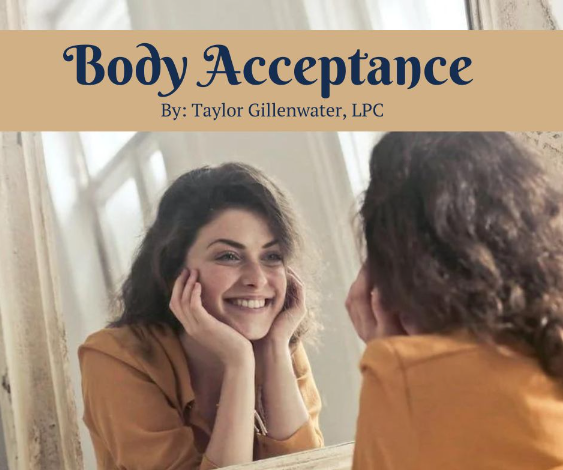
By Taylor Gillenwater MA, LPC
Having issues with the way you see your body is a common experience for both men and women alike. Throughout your lifetime the body goes through many changes that can be difficult to adjust to. Many people struggle with accepting their body and the way it is perceived by others. Extreme emotional distress such as shame, anxiety, depression, and feeling disgusted can all be a result of poor body image (Linden Oaks, 2023).
Body image issues can span from frustration with height and weight to the appearance of skin or specific body parts. When these thoughts and feelings become more severe and frequent it could be considered Body Dysmorphic Disorder, which is “preoccupation with one or more perceived defect or flaws in appearance, which are often unnoticeable to others (National Eating Disorders Association, 2023).”
Even if these flaws are noticeable to others, they are usually normal and are exaggerated by the individual. Another form of body dysmorphia is Muscle Dysmorphia, which emphasizes muscularity and is shown by an obsessive desire to gain lean muscle mass, accompanied by fixating on their perceived lack of muscularity. This type of body dysmorphia is mostly seen in men (Hossieni & Padhy, 2023).
Body checking is a common practice for those with body image issues. Body checking includes things like constantly weighing oneself, squeezing or smoothing perceived problem areas in the mirror, skin picking, and always checking clothing sizes. Some other behavioral signs of poor body image, that may mean you should seek support, are feeling uncomfortable when shopping for clothes, only wearing baggy clothes, not feeling comfortable in anything you wear, changing clothes frequently before going out, and comparing your body to others. People with body image issue may also say things like “I’m ugly,” “I can’t get to XXX weight,” “I can’t get to a size X,” and “I hate my body” (Linden Oaks, 2023).
If this sounds like you or a loved one, seeking support through counseling may be beneficial.
